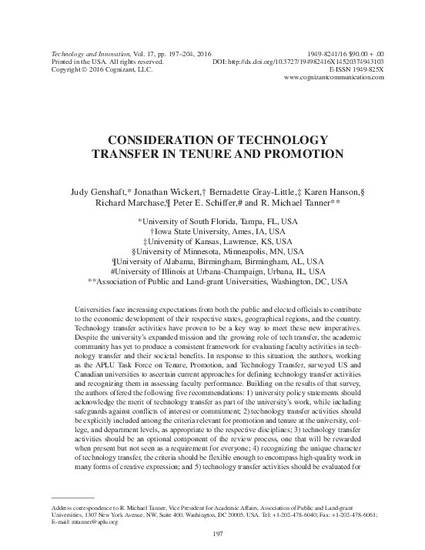
Article
Consideration of Technology Transfer in Tenure and Promotion
Technology and Innovation
Document Type
Article
Disciplines
Publication Version
Published Version
Publication Date
1-1-2016
DOI
10.3727/194982416X14520374943103
Abstract
Universities face increasing expectations from both the public and elected officials to contribute to the economic development of their respective states, geographical regions, and the country. Technology transfer activities have proven to be a key way to meet these new imperatives. Despite the university’s expanded mission and the growing role of tech transfer, the academic community has yet to produce a consistent framework for evaluating faculty activities in technology transfer and their societal benefits. In response to this situation, the authors, working as the APLU Task Force on Tenure, Promotion, and Technology Transfer, surveyed US and Canadian universities to ascertain current approaches for defining technology transfer activities and recognizing them in assessing faculty performance. Building on the results of that survey, the authors offered the following five recommendations: 1) university policy statements should acknowledge the merit of technology transfer as part of the university’s work, while including safeguards against conflicts of interest or commitment; 2) technology transfer activities should be explicitly included among the criteria relevant for promotion and tenure at the university, college, and department levels, as appropriate to the respective disciplines; 3) technology transfer activities should be an optional component of the review process, one that will be rewarded when present but not seen as a requirement for everyone; 4) recognizing the unique character of technology transfer, the criteria should be flexible enough to encompass high-quality work in many forms of creative expression; and 5) technology transfer activities should be evaluated for intellectual contribution and expected social benefit consistent with the accepted process of peer review and without reliance on artificial metrics.
Copyright Owner
Cognizant, LLC
Copyright Date
2016
Language
en
File Format
application/pdf
Citation Information
Judy Genshaft, Jonathan Wickert, Bernadette Gray-Little, Karen Hanson, et al.. "Consideration of Technology Transfer in Tenure and Promotion" Technology and Innovation Vol. 17 (2016) p. 197 - 20 Available at: http://works.bepress.com/jonathan_wickert/28/

This article is from Technology & Innovation, Volume 17, Number 4, 2016, pp. 197-204(8), doi:10.3727/194982416X14520374943103.